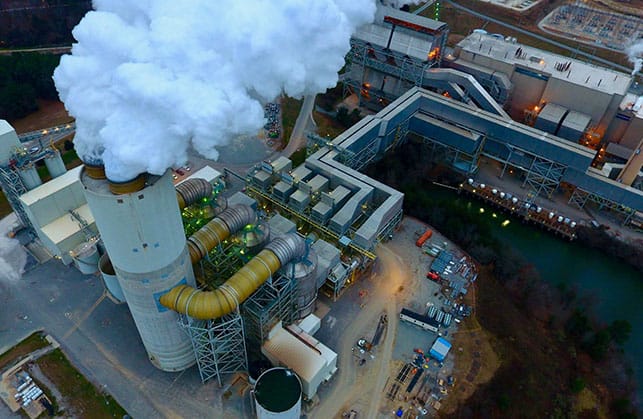Front Porch Blog

North Carolina regulators will allow Duke Energy to waive a legal requirement to reduce its carbon emissions by 70% by 2030, according to an order issued earlier this month.
The requirement is the result of bipartisan legislation that directs the North Carolina Utilities Commission to work with North Carolina utilities to reach carbon neutrality by 2050 and meet an interim target of a 70% reduction by 2030. As a result of this law, the state’s major electric utility, Duke Energy, drafts a Carbon Plan every two years that charts a path for reducing its emissions. The state utilities commission is responsible for reviewing Duke’s plan and ensuring it follows the law.
Instead of enforcing or extending the 2030 deadline, the order directs Duke “to pursue ‘all reasonable steps’ to achieve the [70% reduction] by the earliest possible date” as Duke enters a “critical period of coal plant retirements and significant load growth.” The approved plan includes several new methane gas plants and sets a moderate timeline for solar and wind development.

The commission issued the decision despite comments made by third-party expert witnesses that Duke’s modeling favored the buildout of new gas instead of maximizing more affordable renewable sources and was overly dependent on a transition to uncertain and currently expensive technologies to meet future carbon reduction targets.
Appalachian Voices, represented by the Law Offices of F. Byran Brice, Jr., intervened in the NCUC’s proceedings to review the Carbon Plan to challenge Duke Energy’s proposal to import significant quantities of methane gas into the state through multiple new pipelines and build several new methane gas power plants for electricity generation. Duke proposed the largest gas buildout of any state in the country.
As an intervenor, Appalachian Voices made economic and regulatory arguments against moving forward with Duke’s gas expansion. In North Carolina, utility customers bear the full brunt of volatile methane gas prices: When natural gas prices go up, utility bills go right up with them. With increasing liquid natural gas exports, methane gas is a global commodity. American consumers must compete with international markets as well as domestic disruptions.
Although the NCUC’s order is a setback for our climate and communities living near this gas buildout, the commission approved half the number of combined cycle plants that Duke originally requested. Duke currently does not have enough gas to fuel these plants and will also be required to provide updates on the status of the multiple pipelines that would transport gas to the plants during the application process for the pipelines.
Under the order from the commission, Duke may plan three new large gas plants next year. These proposed gas plants still need to go through separate approval processes in the form of Certificates of Public Convenience and Necessity applications with the state, and the commission states in this order that Duke should not believe “CPCN applications will necessarily be granted by the Commission.”
In addition, we noted that new gas plants may not be the most economical or feasible option to comply with new federal regulations and state law.
For example, to meet the state’s 2050 deadline for carbon-neutral operations, Duke says it will switch these gas plants to hydrogen.
More on Appalachian Voices’ intervention in the 2024 Carbon Plan proceeding
Many witnesses during the Carbon Plan proceedings argued that the true cost of this hydrogen transition is not adequately reflected in Duke’s cost assumptions and that the technology and supply of hydrogen are both uncertain. The commission agreed that “further developments related to hydrogen are necessary before clean hydrogen will be a long-term carbon-free alternative fuel source for the new natural gas resources.” The commission will also require Duke to conduct a pilot hydrogen study to examine the current technologies and potential cost of hydrogen before the next Carbon Plan process.

Although this order has set the stage for future Carbon Plan processes to include more offshore wind, waiving the deadline for a 70% reduction is a missed opportunity for North Carolina to be a leader in the clean energy economy. Duke has created an electricity reliability crisis, either manufactured or incidental, that has pressured the NCUC to not only defer the 2030 deadline to reach emissions reduction compliance, but to ignore the cumulative costs that expensive methane gas plants could mean for North Carolina in terms of fuel and additional technology to reach carbon neutrality.
It is not too late, however, for Duke Energy to deploy more wind and solar plus storage, and employ more investments in energy efficiency and demand-side management programs for their customers. The Environmental Defense Fund has released a white paper that details how this could be possible by 2032.
Duke should also work with other rural and municipal utilities in the state and with its large industrial energy consumers to build more electricity generation on-site where it is being consumed and off of Duke’s grid to solve the high demand that Duke projects. Appalachian Voices will continue to advocate for the rapid advancement of a clean energy economy in North Carolina that will benefit our communities and the places where we live.
PREVIOUS
NEXT

Leave a comment
Your email address will not be published. Required fields are marked *

Leave a Comment